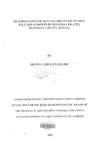| dc.description.abstract | Issues related to women activities through participation in self help groups have gained grounds and are at the center stage in global development discourse. Despite the evidence of women's accomplishments in a given realm of national and local level development, their active participation in various development projects today leaves very much to be desired. The key purpose of the study discussed the determinants of sustainability of women Self Help Groups in Mombasa County.
An overview of the literature review was based on the stated independent variables: Social loafing, decision making processes, third party agents' influence, skills in group dynamics and advisory services. The study adopted descriptive survey research design employing both probability and non-probability sampling methods. It involved a sample size of 130 members from target Population of 752 registered women SHGs comprising of group officials and members selected through random sampling. To ensure validity and reliability of the research instruments, the researcher carried out a pilot study targeting I % of the sampled subject cases, of whom were excluded from the main study. The techniques applied to gather data were administration of questionnaires and personal interviews to respondents who were not comfortable with writing.
Data obtained was analyzed using Statistical Package for Social Sciences (SPSS) and then presented in tabular form in order to measure the magnitude and direction of relationship between variables. The research hypothesis was tested using chi-square method. The findings showed a positive correlation between determinants of sustainability of Women Self Help Groups. It established that members are involved in decision making process an indication of productive and well functioning groups. Regard to influence of third party agents, the study revealed that most groups conduct their activities independently and only seek help on necessary services such as credit facilities and registration.
The study showed that inadequate skills ranked highly among the determinants of group sustainability. Lack of commitment and fmancial constraints were identified as major challenges in the operations and development of the groups. Inadequate provision of advisory services was seen as a major setback in sustainability of the women Self Help Groups. The study also revealed absenteeism among the members hindered the full realization of the groups 'goals and objectives.
The study recommends first, adoption and adherence of the group constitution by members of the Women Self Help Groups. Secondly, capacity building of the members on leadership and communication skills to embrace the tenets of good governance. Thirdly, equipping groups with project management and entrepreneurship skills to enable them plan, organize and manage resources prudently. There needs to be a more comprehensive policy framework that provides for legal recognition of self help movement, a major driving force for development. Fmally, groups should be encouraged to access credit facilities such as loans and grants from the government to enable them raise sufficient funds for development and sustainability of their groups. | en_US |

